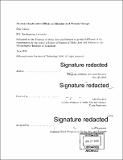Network exploration effects in machine and human groups
Author(s)
Calacci, Dan (Daniel Matthew)
DownloadFull printable version (7.947Mb)
Other Contributors
Program in Media Arts and Sciences (Massachusetts Institute of Technology)
Advisor
Alex Pentland.
Terms of use
Metadata
Show full item recordAbstract
It's long been known that humans, like many animals, exhibit patterns of behavior that appear to balance exploration of new opportunity and resources with exploitation of already-found safe bets. Humans seem to leverage exploration not only to find quality resources, but also to find quality sources of information, such as people or communities. In this thesis, I explore how exploration behavior and the information diversity afforded by such behavior relates to learning and discovery. I first take a theoretical and algorithmic approach to show how considering exploration behavior and information diversity in deep reinforcement learning systems can lead to improved learning. I then present brief observational studies of exploration behavior in two real-world human systems: a social trading network and human mobility in a major U.S. metro area. In the social trading network, I show that users who fail to seek out diverse information far from their local network are more likely to receive low returns from their portfolios. In the case of human mobility, I find that people tend to have more exploratory relationships with places that are more economically diverse. These studies show that information diversity is closely linked to human exploration behavior, and that inefficient exploration can lead to poorer decision-making. Together, the contributions in this thesis paint a preliminary picture of the importance of information diversity in dynamic networks of learners, be they people or machines.
Description
Thesis: S.M., Massachusetts Institute of Technology, School of Architecture and Planning, Program in Media Arts and Sciences, 2018. Cataloged from PDF version of thesis. Includes bibliographical references (pages [59]-63).
Date issued
2018Department
Program in Media Arts and Sciences (Massachusetts Institute of Technology)Publisher
Massachusetts Institute of Technology
Keywords
Program in Media Arts and Sciences ()